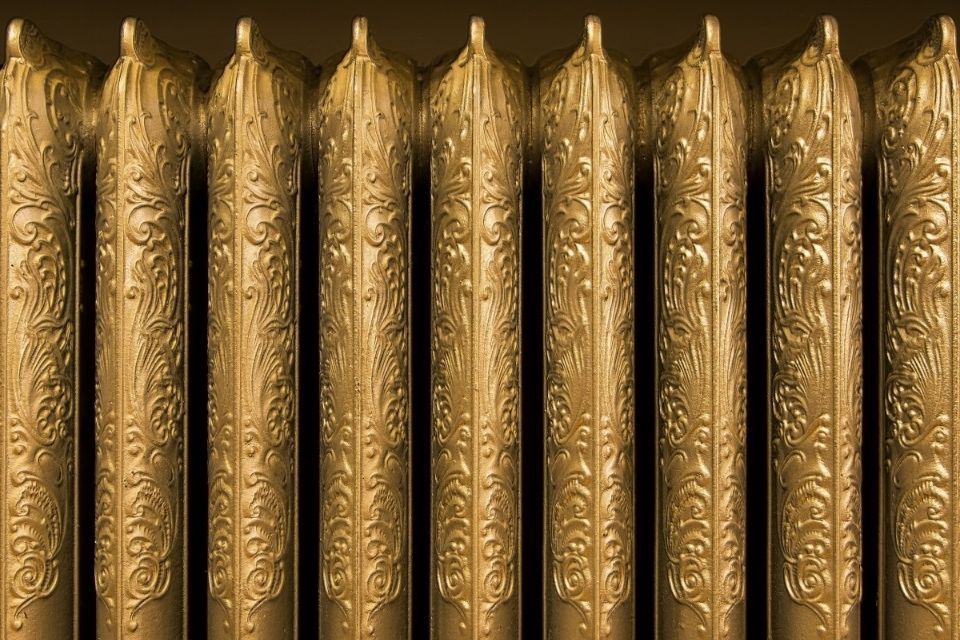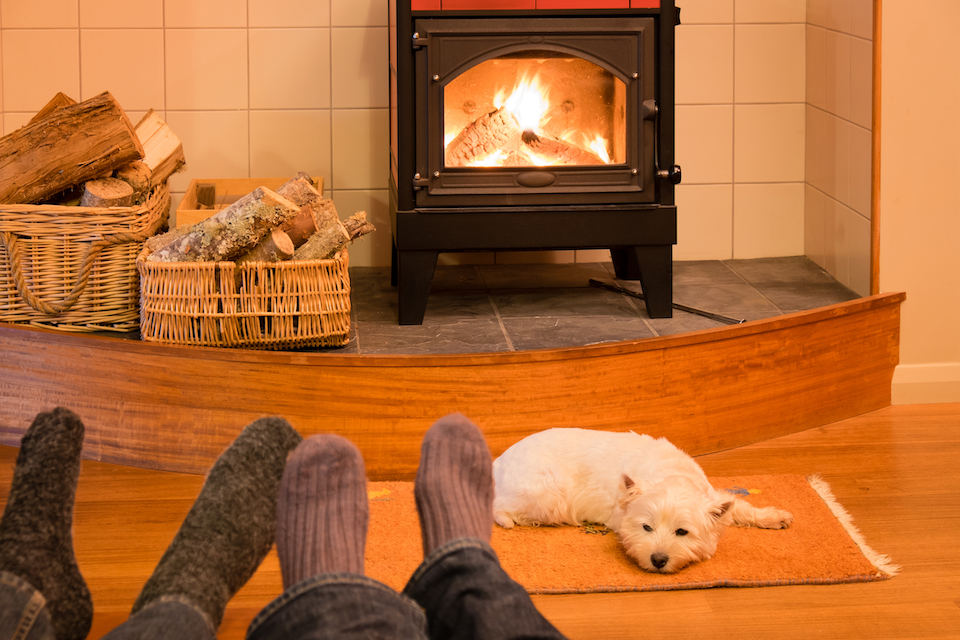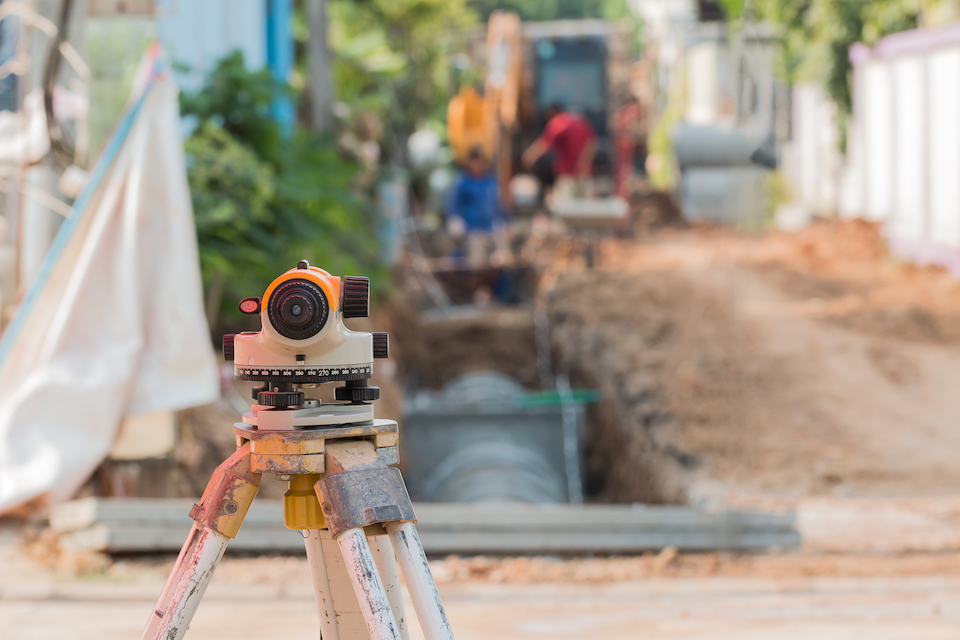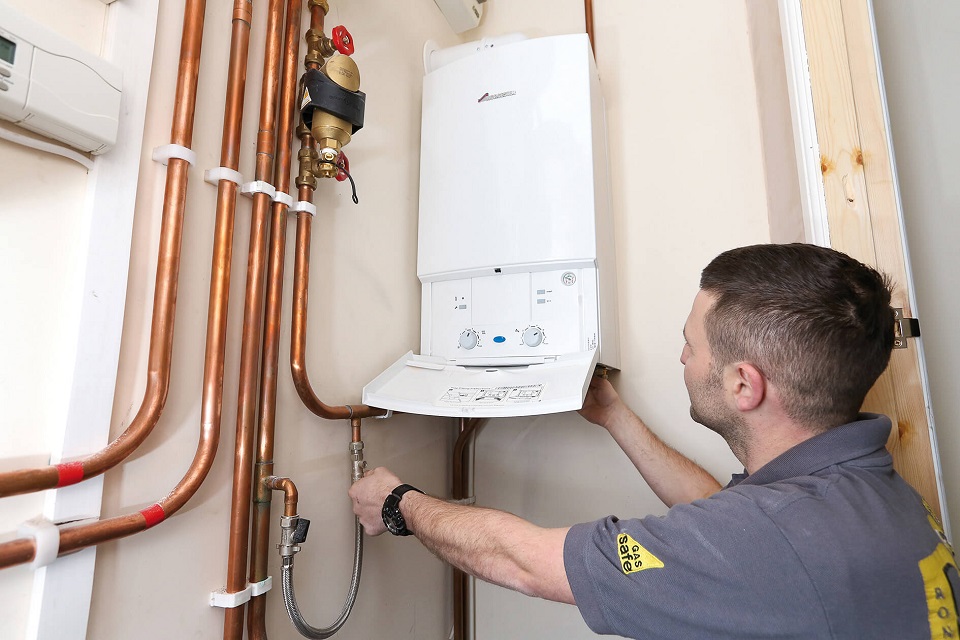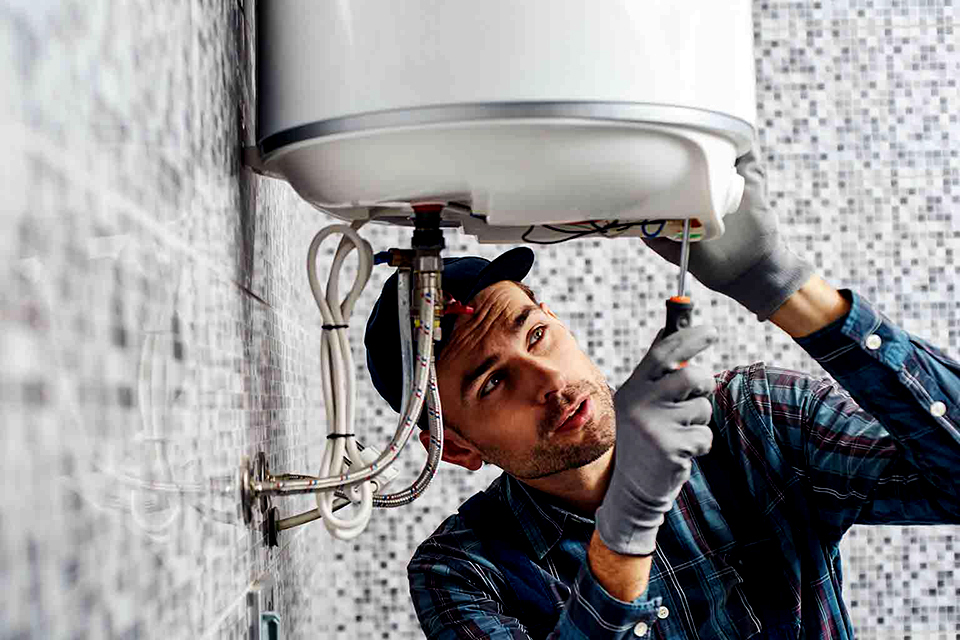How Much Does It Cost to Replace a Warm Air Heating System?
Warm air heating systems were very popular in UK homes during the 1970s. The systems were designed to provide heating using gas-fired units without radiators. Instead, the warm air was distributed throughout the house from grills placed on the walls of each room.
The disadvantage to this system was that it didn’t produce hot water. A separate hot water boiler and cylinder or an immersion heater was also necessary.
But gradually, installing warm air systems of this type fell out of favour and they were replaced by hot water-filled radiators which were heated by a boiler that also provided on-demand hot water, which became very popular, although the old type of warm air systems still remained.
However, now householders are much more interested in saving energy and reducing their carbon footprint. Warm air heating installation is being reintroduced using new technology.
Your old system can be replaced with:
- Modern Boiler
- Air Source Heat Pump
- Ground Source Heat Pump
- Hybrid – Heat Pump and Gas Heating
It means if you have an old warm air system that isn’t as efficient as it used to be. You can upgrade it by adding a modern gas boiler or installing a heat pump.
The cost of replacing a warm air heating system will depend on the size of your property, the type of system you choose and whether or not the installation of new ductwork is straightforward.
The average cost to replace an old warm air system with an air source heat pump ranges from £7,000 to £12,500. Ground Source Heat Pumps are more expensive, and you should expect to pay between £16,000 and £20,500.
Hybrid systems range from £7,600 to £16,300. Replacing an old boiler with a new combi boiler costs between £600 and £3,800.
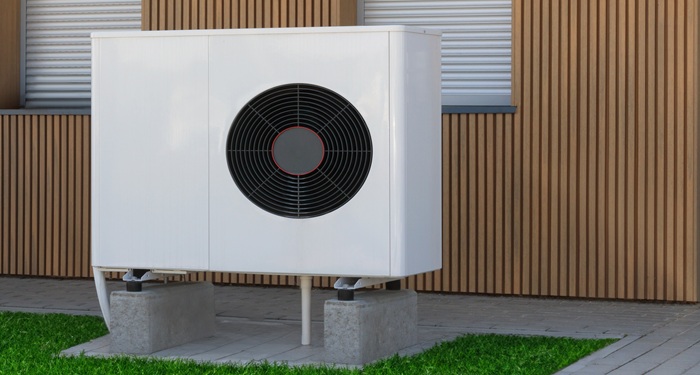
In this guide, we’ll go through the average costs of replacing your old system with an upgrade.
You can find out more about the types of warm air heating available, the additional costs you may need to add to your budget, the labour costs for installation and what government grants and incentives are currently available in 2025.
Read on…
- How Much Does It Cost to Replace a Warm Air Heating System?
- What are the Additional Costs of Replacing a Warm Air Heating System?
- Tradesperson’s Costs for Replacing a Warm Air Heating System?
- How Long Does It Take To Replace A Warm Air Heating System?
- Types of Warm Air Heating Systems
- How Much Does it Cost to Remove an Old Warm Air Heating System?
- Alternative Heating Systems
- Benefits of Upgrading
- FAQs
- Sources
Warm Air Heating System Replacement Prices
There are a number of ways you can replace or upgrade your current warm air system. You can replace your gas-fired unit with a new model or invest in a heat pump system to reduce running costs and lower your carbon footprint.
Many of the old-type boilers are now discontinued, but there are new models available, which cost between £3,200 and £3,850 plus the extras such as thermostat replacement, flue kit fitting and labour, which could be between £1,400 and £2,500. Bringing the total replacement cost to between £4,600 and £6,350.

Modern gas-fired units are also available with hot water integration, but prices aren’t readily available for these models because many are trade-only prices.
Your heating contractor can get you a quote, and it is likely to be in the range of between £4,000 and £5,000, depending on the heating capacity, plus installation, which could increase the cost to between £5,400 and £7,500.
The costs of heat pumps aren’t cheap, and installation is often expensive, but government grants are available for boiler upgrades and heat pump installations, apart from air-to-air heat pumps.
These deductions will help to reduce or cover the cost. Heat pumps range in price from £4,150 to £37,000, depending on the type of system you choose.
Hybrid Warm Air Systems
A hybrid heat pump also includes a boiler to provide heating and hot water. If you are modernising your system by installing a heat pump and your boiler is in good condition, then it might not need to be replaced. In this case, you will be looking at the cost of the heat pump and the installation.
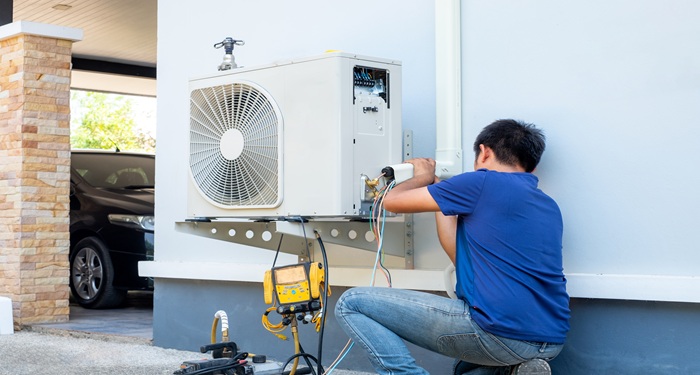
To price a hybrid system, you need to add the cost of a boiler to the price you pay for your heat pump. For example, if you pay £3,500 for a 4 kW air source heat pump and £1,900 for a boiler, your total outlay will be £5,400 for the heat pump and boiler, plus the cost of installation at between £3,200 and £5,500. It will be more if you have to replace old ductwork or controls.
The Average Cost of Replacement Warm Heating System, Including Installation
| Type of Warm Air System | Average Cost |
|---|---|
| Gas-Fired Unit Heating Only | £4,600 - £6,350 |
| Gas-Fired Unit With Water Heating | £5,400 - £7,500 |
| Electric Warm Air System (Air to Air) System | £4,150 - £5,700 |
| Air Source Heat Pump | £8,150 - £17,000 |
| Ground Source Heat Pump | £14,000 - £37,000 |
| Hybrid Warm Air System | £7,700 - £26,400 |
What are the Supply Costs for Warm Air Heating Systems?
The supply costs for a heat pump depend on the system you choose, the features and the energy output. Below, you can see what size heat pump you need to buy depending on the number of bedrooms you have in your property.
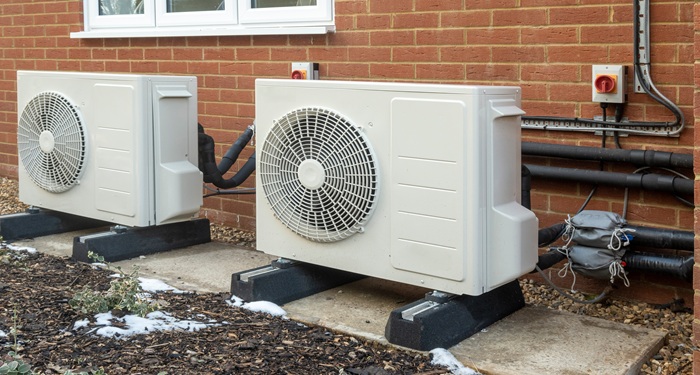
Heat Pump Prices also depend on the output and whether or not you choose to have an air source or ground source model. Ground source models are more expensive because they require excavation to install underground pipework.
Supply Costs of Air Source Heat Pumps
| System Type | Size | Average Cost | |
|---|---|---|---|
| Air Source Pump | 3kw | 1 Bedroom | £2,800 |
| Air Source Pump | 4kw | 2-3 Bedrooms | £3,500 |
| Air Source Pump | 5kw | 2-3 Bedrooms | £3,800 |
| Air Source Pump | 8kw | 4 Bedrooms | £3,950 |
| Air Source Pump | 10kw | 4 Bedrooms | £6,500 |
| Air Source Pump | 16kw | 5 Bedroom plus | £7,000 |
Supply Costs of Ground Source Heat Pumps
| System Type | Size | Average Cost | |
|---|---|---|---|
| Ground Source Pump | 5kw | 1 Bedroom | £5,800 |
| Ground Source Pump | 8kw | 2-3 Bedrooms | £6,800 |
| Ground Source Pump | 10kw | 2-3 Bedrooms | £7,000 |
| Ground Source Pump | 15kw | 4 Bedrooms | £8,300 |
| Ground Source Pump | 19kw | 5 bedrooms plus | £9,250 |
Supply Costs of Hybrid Systems
| System Type | House Size | Average Cost |
|---|---|---|
| Hybrid | 1 Bedroom | £7,700 |
| Ground Source Pump | 2-3 Bedrooms | - |
| Ground Source Pump | 4 Bedrooms | - |
| Ground Source Pump | 5 bedrooms plus | - |
What are the Additional Costs of Replacing a Warm Air Heating System?
When you are replacing your warm air system, there will be additional costs. Some of these costs will be optional, and others will have to be added to your budget.
New Ductwork Installation or Repair
When your system is inspected, if old ductwork is found to be damaged, then it may need to be renewed or repaired. A repair might cost between £100 and £200, depending on the amount that needs repairing and whether or not it includes cleaning as well.
Ductwork replacement costs are normally between £30 and £70 per linear metre, including installation.
Smart Thermostat Upgrade
A smart thermostat will cost you between £75 and £260 to buy and between £80 and £250 for the installation.
You’ll pay more if the wiring is complex or you need an adapter. The total price for supply and installation is between £155 and £510.
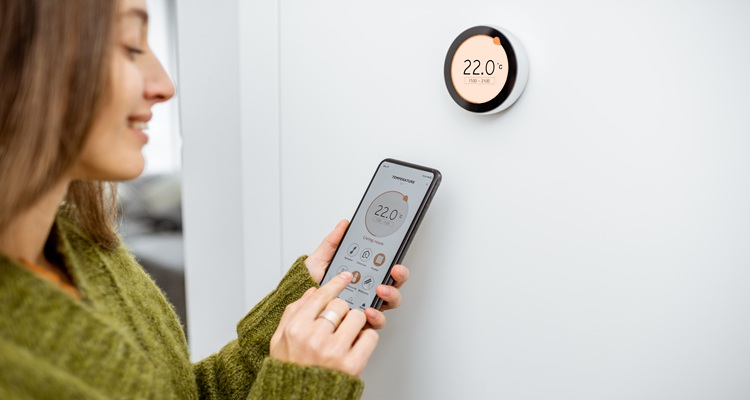
System Balancing and Testing
System balance testing is vital to ensure that the airflow is being distributed evenly throughout your home. This is done by measuring the airflow at each outlet using an anemometer to check the air volume.
You might need this service if you are installing a smart thermostat or you have replaced old ductwork. Full system balancing and testing can cost between £270 and £580.
Removal and Disposal of Old Units
Gas-fired units must be disconnected by a Gas Safe engineer. They may include disposal in the quote for removal, and the cost is likely to be between £100 and £300.
If you have to dispose of the unit yourself, then your local council may have a waste disposal collection. Costs may be on your local authority’s website.
If the unit was installed before 1985, it may contain asbestos. If you want an asbestos survey, then you will be looking at around £200. Asbestos removal may then cost between £300 and £1,000.

Permit or Compliance Fees
Renewing or replacing a warm air heating system doesn’t usually require planning permission, but if you live in a listed building or in a conservation area, then we recommend you check with your local council before you start any work.
You must, however, comply with building regulations. You are obliged to notify the local building regulations department about the work. If you use a contractor who is registered under the competent person scheme, they will do this for you.
But if you use a non-registered contractor, then the costs of a building control inspection will be between £100 and £300.
Tradesperson’s Costs for Replacing a Warm Air Heating System?
The cost to replace a warm air heating system will include the old system's removal and the installation of the new system.
To remove an old boiler, you will normally pay between £600 and £800 and then labour charges to fit the new boiler. A combi-boiler will take between one and a half and two days to install, so you are likely to pay between £390 and £800 for the installation.
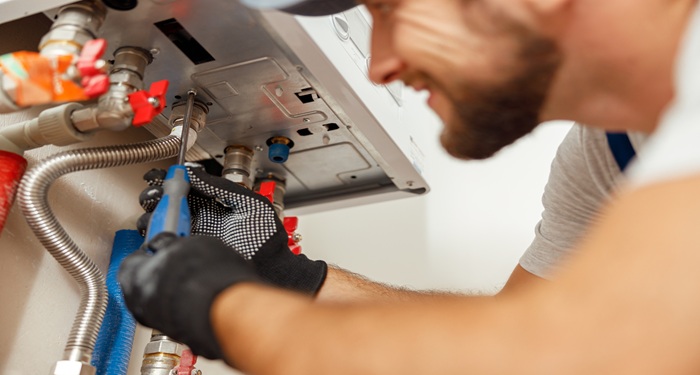
A heating engineer typically charges between £260 and £400 per day. Therefore, for your old boiler removal and the installation of a new one, you can pay between £990 and £1,600.
Labour Costs to Install a Warm Air System with an Air Source Heat Pump
| Number of Bedrooms | Type of Heating System | Average Installation Costs |
|---|---|---|
| 1 bedroom | Air Source | £1,750 - £2,250 |
| 2-3 bedrooms | Air Source | £3,500 - £6,500 |
| 4 bedrooms | Air Source | £5,600 - £8,640 |
| 5 bedrooms | Air Source | £7,000 - £10,000 |
Labour Costs to Install a Warm Air Heating System with a Ground Source Heat Pump
| Number of Bedrooms | Type of Heating System | Average Costs Vertical Installation | Average Costs Horizontal Installation |
|---|---|---|---|
| 1 bedroom | Ground Source | £8,000 - £9,525 | £5,000 - £6,000 |
| 2-3 bedrooms | Ground Source | £18,500 - £19,050 | £10,000 - £12,000 |
| 4 bedrooms | Ground Source | £25,000 - £27,500 | £14,000 - £15,500 |
| 5 bedrooms | Ground Source | £40,000 - £42,000 | £22,000 - £24,000 |
Labour Costs to Install a Hybrid Warm Air System
| Number of Bedrooms | Type of Heating System | Average Installation Costs |
|---|---|---|
| 1 bedroom | Hybrid | £2,700 - £3,850 |
| 2-3 bedrooms | Hybrid | £3,600 - £5,100 |
| 4 bedrooms | Hybrid | £5,200 – £6,650 |
| 5 bedrooms | Hybrid | £6,700 - £8,400 |
These costs are ballpark figures. If you have a complex installation or additional ductwork, then labour costs will be higher. You should expect to pay more for labour if you live in London or the South East of England, where service costs are generally higher than in other parts of the UK.
Although a heating engineer often charges an hourly or daily rate, in the case of a warm air heating replacement, you are likely to receive a quote for the whole project.
Ground source heat pump installation includes excavation or drilling and pipe laying, and if access is difficult, then specialist machinery may be needed.
How Long Does It Take To Replace A Warm Air Heating System?
All warm heating installations will be influenced by the ease of access and the weather (especially if you are excavating land in your garden for a ground source heat pump).
Direct Replacement - Swapping an old unit for a new one and reconnecting it to existing ductwork will take between 1 and 2 days.
Full Warm Air Upgrade with New Ductwork – This will require the replacement of the old warm air unit and an upgrade of the ductwork. Insulation can be added, and ducts and vents can be replaced with new ones. Expect this work to take between 3 and 5 days.
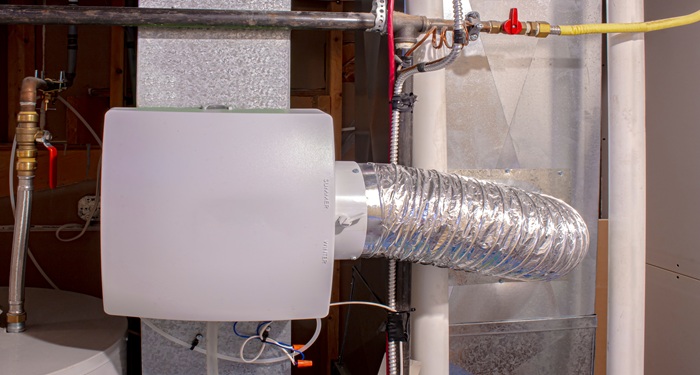
Renewal of the whole system and Installation of a Hybrid system – The old unit and the gas pipe will have to be removed, and an air-to-air heat pump installed. Ducts and vents will be replaced and electrics upgraded. This work is likely to take between 5 and 7 days.
Radiator-based conversion - Removal of the complete warm air system and installation of pipework and radiators. Fitting of a new boiler or air-to-water heat pump with controls. A heating engineer is likely to take between 7 and 12 days for this installation.
Installation of Ground Source Heat Pump – This is a more complex installation, and naturally, it takes more time. The process starts with a site survey and involves drilling or trenching to lay pipework. From start to finish, without delays, the project can take between 7 and 30 days. The work will be faster on a new build property where access isn’t an issue.
Types of Warm Air Heating Systems
Warm air systems are known as dry heating. They work well in well-insulated homes where heat is kept inside efficiently.
Warm air heating uses a vent to draw in cold air from the outside, and then, using a gas flame or a heat exchange, the cold air is warmed up and spread throughout the house from grills or air ducts on the walls.
The temperature is controlled by a thermostat, but you can also open and close the grills in each room.
When the warm air has heated the room, the system stays on standby until the temperature drops, and then it will begin the heating process once again.
The old systems of the 1970s have now been replaced with air pump technology. Heat pumps are now becoming a popular alternative to gas boiler heating because they are energy-efficient and reduce your carbon footprint.
There are four common types of warm air heating systems, and these are:
Gas Warm Air Systems
Warm air systems use a gas-fired warm air unit, like a boiler, but there are no radiators; instead, the room is heated by the Warm air that comes through vents or grills in the walls.
New systems now include the ability to produce hot water and can include air filters and humidifiers to improve air quality. The estimated cost to buy and install a gas system is between £4,600 and £7,500, depending on whether or not you choose a heat-only system or one with hot water and heating.
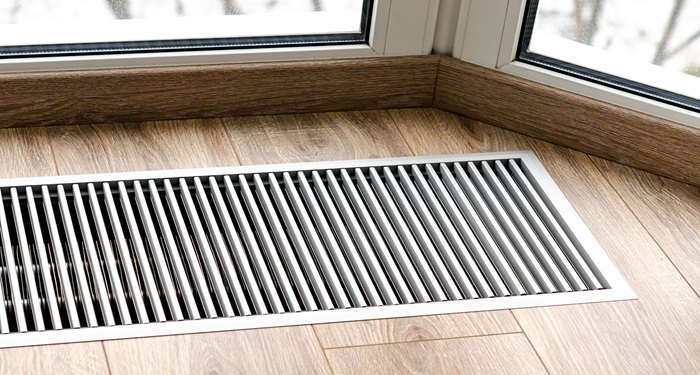
Pros:
- Heats up quickly
- No need for radiators
- Cheaper to install than heat pumps
Cons:
- Doesn’t retain heat once the system has shut down
- Ductwork needs to be properly insulated
Electric Warm Air Systems
Heat pumps are the most common type of electric warm air heating. Heat pumps use electricity to convert heat taken from outside to circulate around your home. There are two types of heat pumps:
Air Source Heat Pumps
An air source heat pump is a unit that’s placed outside your home. It’s usually in the back garden and it takes up a small amount of space.
When they are being used, they emit around 40 to 60 decibels, which is about the same as your fridge, although they may sound louder in cold weather when they have to work harder.
The cost to supply and install an air pump warm air system is between £6,400 and £11,000.
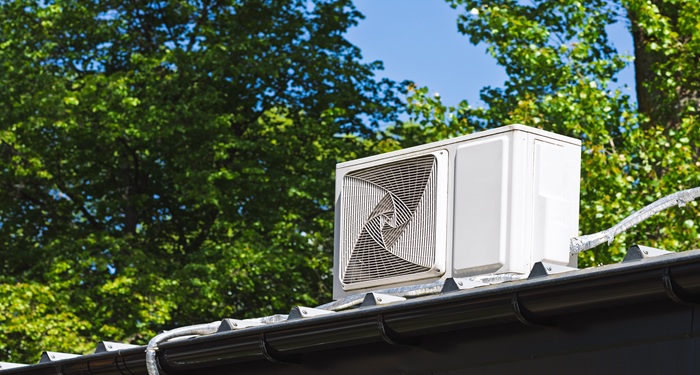
Pros:
- Some models also have cooling capabilities
- Can be modified for smart controls
- Cheaper to install than a ground source heat pump
Cons:
- Not as efficient in very cold weather
- Slower to warm up than a gas boiler
Ground Source Heat Pumps
Ground source air pumps transfer heat from the ground. It consists of a heat pump, an underground heat exchanger and pipes. The installation costs are high because boreholes need to be dug or trenches laid for the pipework. Most residential properties will have a vertical ground source heat pump.
Properties with plenty of land might choose to have a horizontal ground source heat pump, which uses the energy from the sun to heat the ground, and the fluid absorbs the heat from the surface soil, unlike a vertical pump, which absorbs heat using ground loops (pipes).
The cost of installing a ground source heat pump is between £14,000 and £37,000, depending on the size and the type of unit you choose.
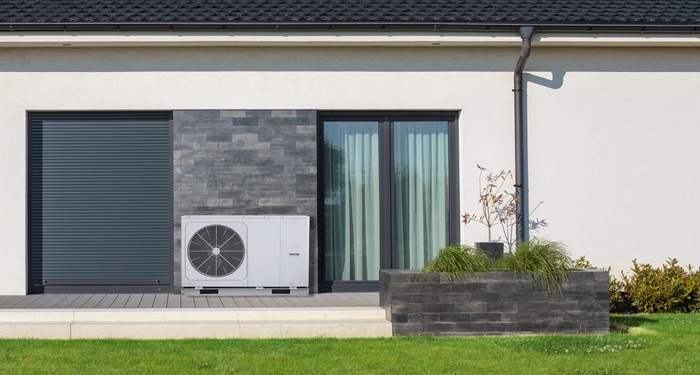
Pros:
- Lower running costs than gas
- Ground temperature is not affected by weather
- No noise when in operation
Cons:
- Expensive to install
- Needs garden space or land
Hybrid Systems
Hybrid systems are a combination of a heat pump and a boiler to provide heating and hot water. They are ideal for homes that require a lot of heating because they alternate between using the electricity from the heat pump and the gas from the boiler.
Hybrid systems generally cost on average between £8,600 and £10,900.
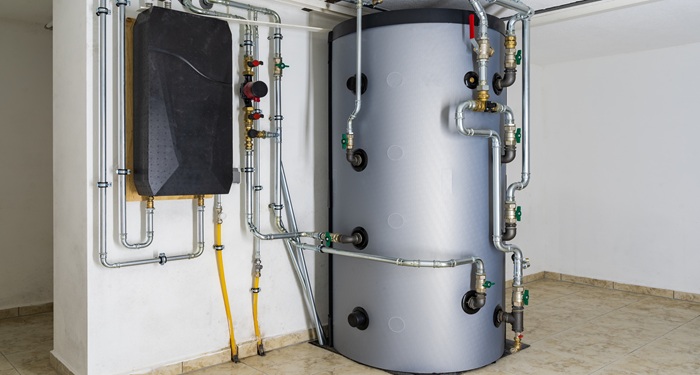
Pros:
- Low running costs
- The boiler is only needed at peak times, so it is more energy efficient
- Ideal if your home isn’t well-insulated
Cons:
- Not suitable for homes without outdoor access
- Expensive Installation
High-Efficiency Condensing Units
A high-efficiency condensing unit is powered by gas. It uses a condenser to create additional heat from water vapour and is much more efficient than units without a condenser. These units can also be combined with a combi-boiler for heating and hot water.
Combi Boiler Prices depend on the size you need for your property. For example, a well-insulated property built after the year 2000 is likely to need a range between 4 kW and 10 kW, depending on the size of your home. 1990s properties that have average insulation will need between 6 kW and 12 kW.
| Bedrooms | Output | Average Price |
|---|---|---|
| 1-2 bedrooms | 24 – 26kw | £599 - £1,400 |
| 3-4 bedrooms | 28 - 22kw | £1,900 - £3,000 |
| 4 plus bedrooms | 34 - 42kw | £2,000 - £3,800 |
The cost of supplying and installing a high-efficiency condensing unit is between £3,200 and £5,600, depending on the heat output of the unit.
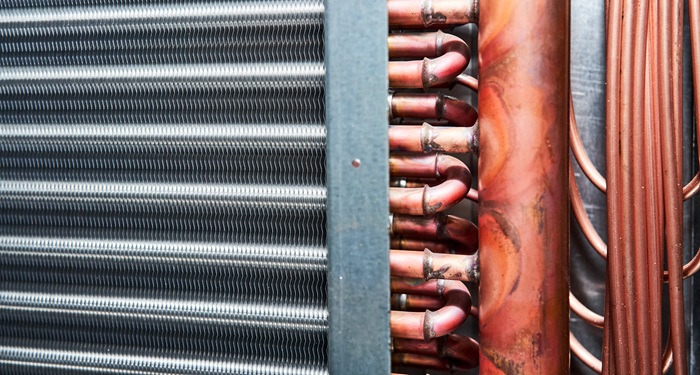
Pros:
- High energy efficiency
- Cheaper than an air pump installation
- Fast air circulation
Cons:
- Not widely available
- Doesn’t retain heat like radiators
How Much Does it Cost to Remove an Old Warm Air Heating System?
The average cost to remove an old warm air heating system is between £600 and £1,250, depending on the size of your home. The work includes disconnecting the gas and electricity, and the removal of all ductwork.
In addition to this, the cost is the disposal of the unit and materials. The contractor may include this in their quote at a cost of between £100 and £250.
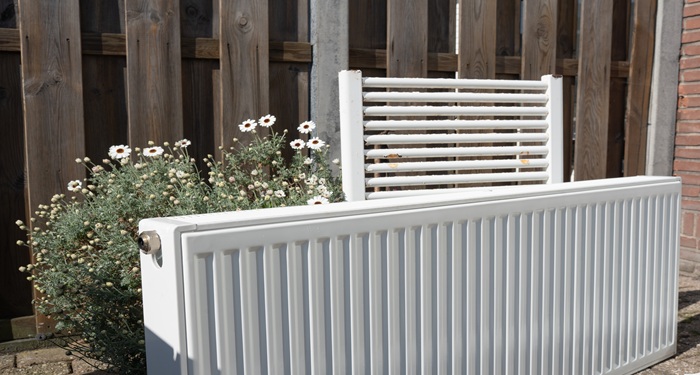
Another cost you may incur is if the contractor finds asbestos in the system. In this case, it is likely to have to be removed by a professional. An asbestos survey will cost around £200, and then the removal will be between £10 and £40 per m2, including labour.
Alternative Heating Systems
If you’ve decided a warm air system isn’t for you, then you might want to consider installing a wet radiator system. That means installing a traditional central heating system with a boiler and radiators or underfloor heating.
Central Heating
A central heating system normally comprises a boiler, a water tank (unless you have a combi-boiler), pipework, a thermostat and radiators.
The average cost for the installation of a central heating system that includes a water tank and 9 radiators will cost between £3,430 and £5,050 and will take between 4 and 8 days to complete the work.
A plumber typically charges between £170 and £310 a day; therefore, labour charges for 4 to 8 days will be between £680 and £2,480. However, they may charge on a per-project basis.
Underfloor Heating
Another type of heating you may want to consider is underfloor heating.
There are two types of underfloor heating, wet and dry. Dry underfloor heating is powered by electricity, and wet underfloor heating is powered by a boiler.
A dry system is more suitable for a home renovation and will cost between £1,650 and £5,900. A wet system connected to a boiler is the most common option. The cost of a wet system is between £4,100 and £14,700.
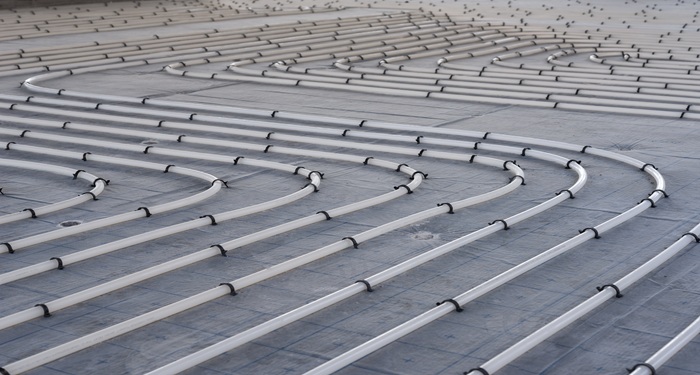
Storage Heating
Storage heaters use electricity. They store heat inside the unit and release it when you want to use it. The electricity is normally stored on an economy tariff, which is often cheaper overnight.
Modern storage heaters have heating controls such as thermostats and programmers. A modern storage heater will cost around £450, and installation by an electrician will be around £70. The cost of using storage heaters is more expensive than gas central heating, but you might find them installed in small flats.
Government Grants and Incentives
Government grants and incentives are available to householders who want to install a low-carbon heating system. That means if you want to upgrade to a heat pump and you fit the criteria for a grant, then you can receive up to £7,500 on installation costs.
These are the grants available in the UK in 2025:
The Boiler Upgrade Scheme (BUS) will provide up to £7,500 for heat pump installation in England and Wales.
Energy Company Obligation Scheme (ECO4) provides financial help to low-income families who want to install a low-carbon energy system in England, Scotland and Wales.
Warmer Homes Scotland provides interest-free loans of up to £15,000 for people in Scotland.
Nest Scheme Wales may cover the full cost of air source heat pump installation for low-income households.
0% VAT will be applied to householders installing heat pumps. This discount is applied automatically by your heat pump installer.
For information about energy grants in Northern Ireland, you can access the nidirect website.
It’s also worth checking with your local council to see whether they are offering any grants or incentives, and the community energy website has more information about funding opportunities for community projects.
Benefits of Upgrading
If your current warm air system is old, then an upgrade will likely increase its efficiency and reduce your heating costs. Newer systems also have better air quality features, which will increase your comfort.
Other advantages are that an upgrade will lower your carbon footprint, and there is the potential for an increase in the value of your home.
A house with a modern, energy-efficient heating and hot water system will have better buyer appeal than an old system, especially if it features smart controls and hot water.

Considerations Before Upgrading
There are a number of considerations you need to think about before deciding to replace or upgrade your warm air heating system. You should ask yourself the following questions:
- Will the upfront costs mitigate the long-term savings?
- Do I have the space for an alternative system?
- Can I live with the disruption during installation?
- Is my existing ductwork compatible with a newer system?
FAQs
Q: Are warm air systems still used in the UK?
A: Yes, they are. But most manufacturers have now ceased to make the old heating units. In fact, in the UK, there is only one major manufacturer of residential warm air heating systems, and that is a company called Johnson & Starley.
Q: What is the most cost-effective replacement for warm air heating?
A: Without the availability of a grant, if your ductwork and insulation are in good order, then the most cost-effective upgrade would be to replace your old heating unit with a modern condenser unit to supply warm air heating and hot water. The costs on average are between £5,400 and £7,500.
But if you meet the criteria for a grant under the Boiler Upgrade Scheme, then you would be better off having an air source heat pump installed.
The cost for an air source heat pump is between £8,150 and £17,000, but this would be reduced by £7,500, bringing the cost down to between £650 and £9,500.
Q: Can I upgrade my warm air system to work with smart thermostats?
A: Yes. Older systems may need an adaptor, but most air heater units can be converted. If you have a heat pump, then using a smart thermostat will give you more control and efficiency.
Q: Is it better to replace or convert to a different heating system?
A: The choice is yours. If you have a very old system, then it may be a false economy to renew a boiler when the ductwork may need repair, and the insulation isn’t very good.
In that case, it would be better to renew your whole system. If, however, the cost is not an issue, you can take advantage of the available government grants, and it might cost you less to convert to a heat pump system.
Q: How long will a new warm air system last?
A: If you have a professional installation and you maintain your system with annual checks, then your system could last up to 20 years.


